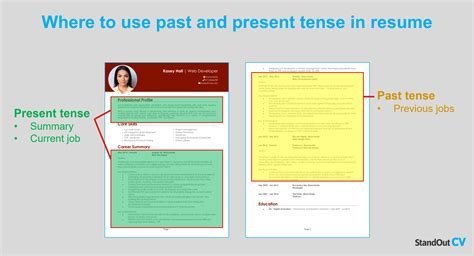Learn how to effectively use past and present tense in your resume to highlight your achievements and attract potential employers. Expert guidelines included.Are you in the process of updating your resume? One important aspect to consider is the tense in which you should write it. The decision to use past or present tense in your resume can have a significant impact on how your experiences and accomplishments are perceived by potential employers. In this blog post, we will explore the importance of resume tense and provide guidelines for using past and present tense effectively. We will also discuss the benefits of using past tense to highlight past experiences and the advantages of using present tense to showcase your current skills and responsibilities. By the end of this post, you will have a clear understanding of how to strategically use tense in your resume to make a strong and impactful impression on employers. So, let’s dive in and discover the best practices for utilizing tense in your resume to maximize its potential.
Introduction to Resume Tense
Introduction to Resume Tense
When it comes to writing a resume, one of the key considerations is the use of tense. The tense in which you write your resume can have a significant impact on how your experiences and skills are perceived by potential employers. Understanding the different tenses and their implications is crucial for creating a resume that effectively showcases your qualifications and abilities.
There are three main tenses that are commonly used in resume writing: past tense, present tense, and future tense. Each tense has its own set of rules and guidelines, and knowing when and how to use each one can make a big difference in the effectiveness of your resume. In this blog post, we will explore the basics of resume tense and provide tips for using the correct tense to highlight your achievements and qualifications.
Benefits of Using Past Tense
When considering the use of past tense in a resume, it is important to understand the benefits of this approach. Using past tense allows for a clear and consistent presentation of your past experiences and achievements. This helps potential employers to easily understand the timeline of your professional history and the specific impact you have had in previous roles.
Another benefit of using past tense in a resume is that it demonstrates a sense of completion and accomplishment. By describing your past roles and responsibilities in the past tense, you are emphasizing that you have successfully fulfilled these duties and achieved results in your previous positions. This can help to convey a sense of credibility and competence to potential employers.
Additionally, using past tense in a resume can help to create a more professional and polished impression. It shows that you are reflecting on your past experiences in a composed and organized manner, which can be appealing to hiring managers. Overall, using past tense in a resume can enhance the clarity, credibility, and professionalism of your document, making it more effective in communicating your qualifications and suitability for a job.
Advantages of Present Tense
When it comes to writing a resume, using present tense has several advantages. Firstly, it creates a sense of immediacy and relevance, making your experiences and accomplishments feel current and impactful. This can capture the attention of the reader and convey a sense of proactiveness and ongoing involvement in your previous roles.
Additionally, using present tense allows you to emphasize your transferable skills and capabilities, as it presents your past experiences as continuous and relevant to your current potential. This can be especially beneficial when applying for a job in a different industry or transitioning to a new career path.
Furthermore, using present tense in your resume can help you communicate a proactive and forward-thinking attitude, which can be appealing to potential employers. It can convey a sense of confidence, energy, and potential contribution, which may set you apart from other candidates who use past tense for their resume content.
Guidelines for Tense Usage in Resumes
When it comes to writing a resume, it’s crucial to pay attention to the tense usage. The tense you use can greatly impact how your experiences are perceived by potential employers. It’s important to maintain consistency throughout your resume, whether you choose to use past or present tense.
One guideline for tense usage in resumes is to use past tense for previous work experience. This means that when describing your previous job duties and achievements, you should use verbs in the past tense. For example, instead of saying I lead a team of analysts, you should say I led a team of analysts. This helps to clearly convey that the experience is no longer ongoing.
On the other hand, present tense can be used for your current job or any ongoing responsibilities. Using present tense in this context can help demonstrate that the experience is current and ongoing. For instance, you might say I oversee a team of professionals to indicate that the responsibility is still ongoing.
